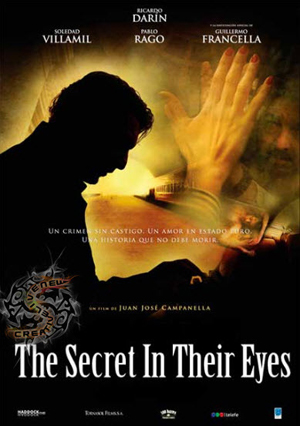By Leila Miller, Arts Editor
In The Secret in Their Eyes, an Argentine movie that won Best Foreign-Language Film at this year’s Oscars, an unspeakable crime left unpunished causes all involved to be stuck in time, unable to move forward with their lives until justice is reached. A romantic film yet riddled with violence, The Secret in Their Eyes grips you with a plot that constantly twists. Don’t be daunted by the subtitles. Instead, think culture and sophistication.
Unfolding mostly in Buenos Aires’ grand court house and at the train station, the film oscillates between the present and the mid-1970s. Protagonist Benjamin Espósito (Ricardo Darín), is a retired investigator for a criminal court, separated from his wife and living alone, who feels that he has reached the end of his life. At last free of distractions, he decides to write a book on an unresolved rape and homicide case that he had pursued 25 years earlier.
Espósito had been reluctant at first to take on the case, but seeing the victim’s beauty and the brutality inflicted on her, as well as the intense suffering of her husband, he was convinced. Looking through the couple’s photo albums for suspects, he noticed that in several pictures, a young man was eyeing the girl in a certain way. Espósito had no evidence to prove it, but the murderer’s eyes suggested obsession.
A young man at the time of the crime, Espósito quietly fell in love with the second-in-command to the investigations judge, Irene Hastings (Soledad Villamil), a sharp, upper-class woman – unreachable for someone like Espósito. But no romance emerges as the pair becomes absorbed in trying to attain justice in the murder case.
The story thus focuses on unfinished and torn relationships, with obsessed lovers’ eyes revealing their true emotions — hence the movie’s title. Director Juan José Campanella deftly uses the symbol of open and closed doors to portray relationships. In one that was never consummated, an office door always remains publicly opened. But viewers are also forced to imagine another door, one that is shut when a murderer commits his crime.
Various characters in the film are permanently stuck in time, waiting for a resolution that only justice can give – a theme that is expanded upon well. In the months following the crime, the husband of the victim, Ricardo Morales, spends his days sitting in busy train stations as he waits vainly for his wife’s murderer to appear.
Espósito never tells the woman he loves that he loves her and is never able to find someone else, illustrating the consequences of swallowed words. Time goes by, leaving him with an empty life. In retirement, he reflects on his loneliness, and doesn’t like what he sees.
The movie is very violent, with periodic graphic flashbacks to the rape, a second murder, and a general feeling of foreboding. But touches of film noir add an edge. In one extremely moving scene — yes, it’s at a train station — a woman and a man wearing black and white say farewell in a sea of bright colors. As the train’s wheels pick up speed, she starts running alongside it, her hand pressed against its window mirroring his on the other side.
The film’s theme of unresolved crime leaving people unable to move on with their lives is especially relevant for Argentina. The country allowed many decades to go by without punishing perpetrators for the disappearance of 10,000 people during the 1970s military regime.
Compelling acting matches the complex characters and heightens the tensions that build a mood of unpredictability. Isidoro Gomez (Javier Godino), the murderer, defines the word “creepy.” You can sense evil behind his quiet, calculating eyes whenever he appears – usually very unexpectedly. And the victim’s husband (Pablo Rago), whose face conveys his burning longing for his dead wife until it’s replaced with — sorry, I can’t give away the ending. Close-ups, usually on the actors’ faces, most notably on their eyes, communicate strong emotions – no doubt making the acting more challenging.
This is a film that doesn’t focus on special effects or the high-tech of the typical American thriller. Instead, it is completely propelled by a suspense-packed plot cued by melody. Softly treading piano music rising gradually with violins matches the movie’s subdued tone.
If you have never dared to see a foreign film before, risk it, and see this one at a local theatre now while it’s still out. As a reviewer born in Argentina who spends her summers there, I can tell you that with its cursing, cafés, flirty come-ons, and typical Argentine friendliness and familiarity, this film will carry you to a new setting. Neither a full-on violent thriller nor a romance, The Secret in Their Eyes exemplifies Argentine refinement at its best and will remain with you long after you’ve seen it.








